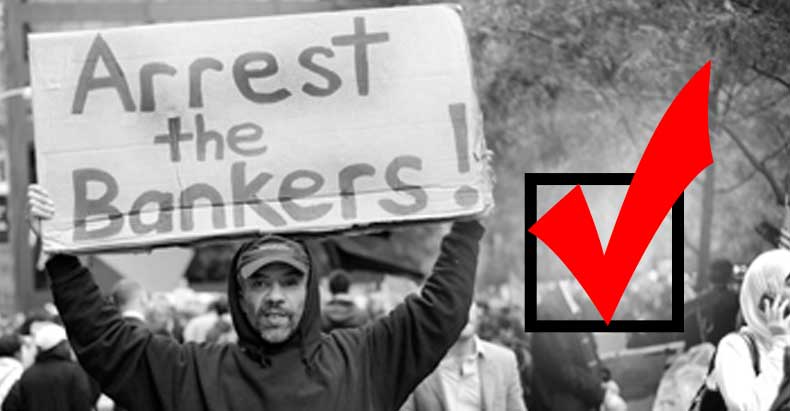October 9th, 2016
By Nadia Prupis
Since its 2008-2011 financial crisis, Iceland has received global recognition for its strategy of prosecuting executives, letting banks go bust, and focusing on social welfare. Now Iceland, which became a gold standard for corporate accountability in the wake of the crisis, has found nine bankers guilty for market manipulation in one of the biggest cases of its kind in the country’s history.
The verdict from Iceland’s Supreme Court, issued Thursday October 6th, overturns a June 2015 decision by the Reykjavik District Court, which found seven of the nine defendants guilty but acquitted two. Sentencing has yet to be handed down yet.
All nine defendants worked at the major international firm Kaupthing Bank until it was taken over by the Icelandic government during the crash. The bank’s former director Hreiðar Már Sigurðsson, who was sentenced to five and a half years in 2013 in a separate Kaupthing case, had his punishment extended by six months in response to the verdict. Acquittals were overturned for former Kaupthing credit representative Björk Þórarinsdóttir and former Kaupthing Luxembourg CEO Magnús Guðmundsson.
According to the Iceland Monitor, the decision found that “[b]y fully financing share purchases with no other surety than the shares themselves, the bankers were accused of giving a false and misleading impression of demand for Kaupthing shares by means of deception and pretense.”
The road to recovery
“This determination to hold people to account for actions that caused intense financial misery contrasts strongly with the U.K., the rest of Europe and the US. Yes, fines were imposed on the 20 biggest banks for transgressions such as market manipulation, money-laundering and mis-selling mortgages, but these costs fall on shareholders and, by hampering the banks’ ability to lend, they also punish the rest of society. Meanwhile the guilty senior bankers, thanks to government bail outs, carry on making enormous profits and collecting their obscene bonuses as though nothing happened.” ~ Baxter Dmitry
Since the financial crisis, Iceland has received widespread recognition for its strategy of prosecuting bankers, imposing strict market controls, and allowing the international banks to go bust while the government supported domestic accounts and focused on social welfare — a far cry from the U.S. approach of bailing out its banks with taxpayer money and allowing their executives to escape punishment.
In 2015, the International Monetary Fund (IMF) announced that Iceland had achieved economic recovery with employment rates that rivaled countries like the U.S., “without compromising its welfare model” of free health care and education.
“Iceland has rebounded after the 2008/9 crisis and will soon surpass pre-crisis output levels with strong performance in tourism and fisheries… the first 2008-10 crisis country in Europe to surpass its pre-crisis peak of economic output. … Debt ratios are on a downward path and balance sheets have broadly been restored. The financial sector is back on track though with some important items remaining on the docket.” [source]
Nadia Prupis is a staff writer for CommonDreams.org. This work first appeared on CommonDreams.org and is licensed under a Creative Commons Attribution-Share Alike 3.0 License.

If you've ever found value in our articles, we'd greatly appreciate your support by purchasing Mindful Meditation Techniques for Kids - A Practical Guide for Adults to Empower Kids with the Gift of Inner Peace and Resilience for Life.
In the spirit of mindfulness, we encourage you to choose the paperback version. Delve into its pages away from screen glare and notifications, allowing yourself to fully immerse in the transformative practices within. The physical book enriches the learning process and serves as a tangible commitment to mindfulness, easily shared among family and friends.
Over the past few years, Wake Up World has faced significant online censorship, impacting our financial ability to stay online. Instead of soliciting donations, we're exploring win-win solutions with our readers to remain financially viable. Moving into book publishing, we hope to secure ongoing funds to continue our mission. With over 8,500 articles published in the past 13 years, we are committed to keeping our content free and accessible to everyone, without resorting to a paywall.







